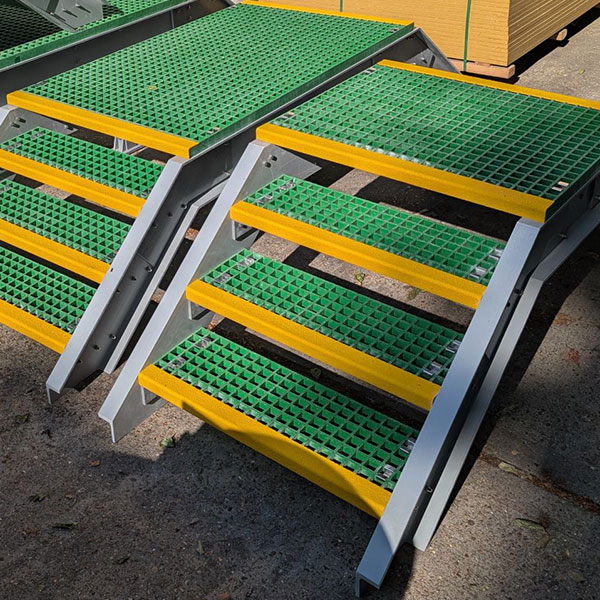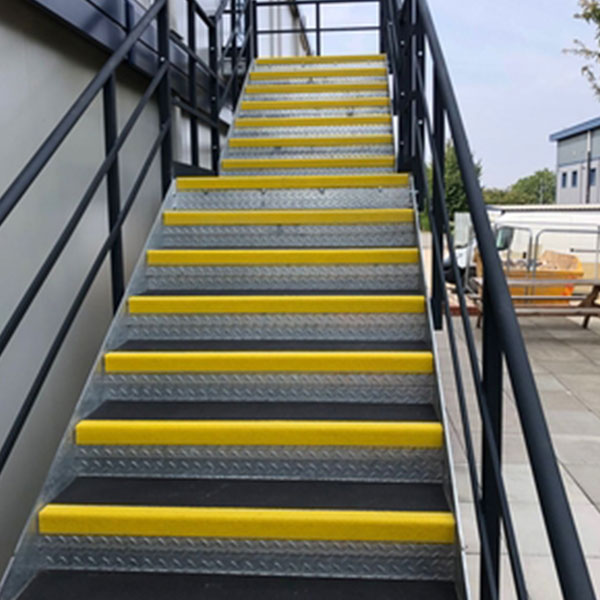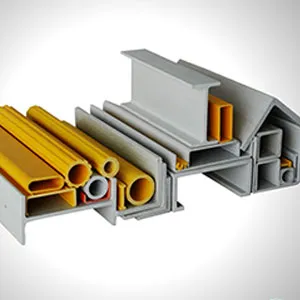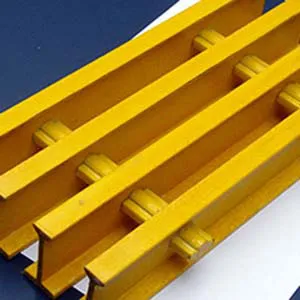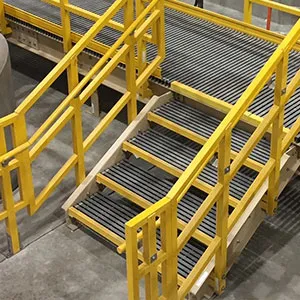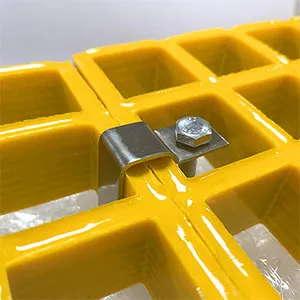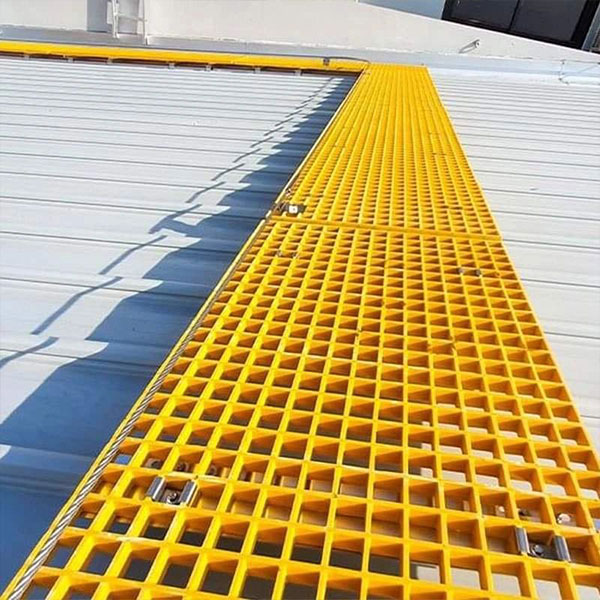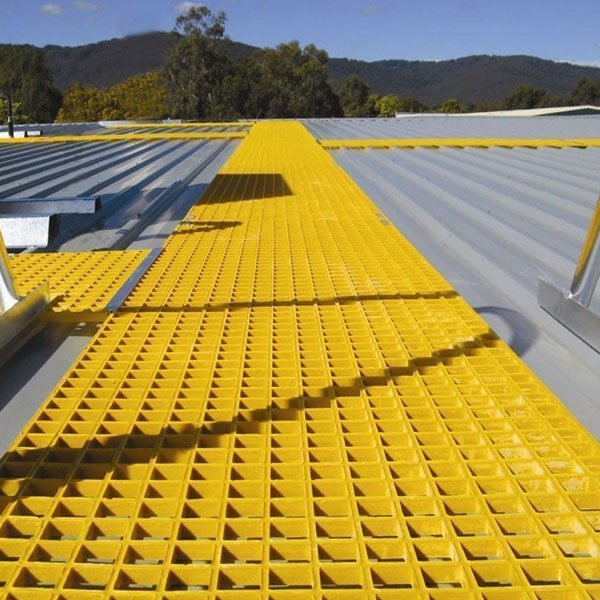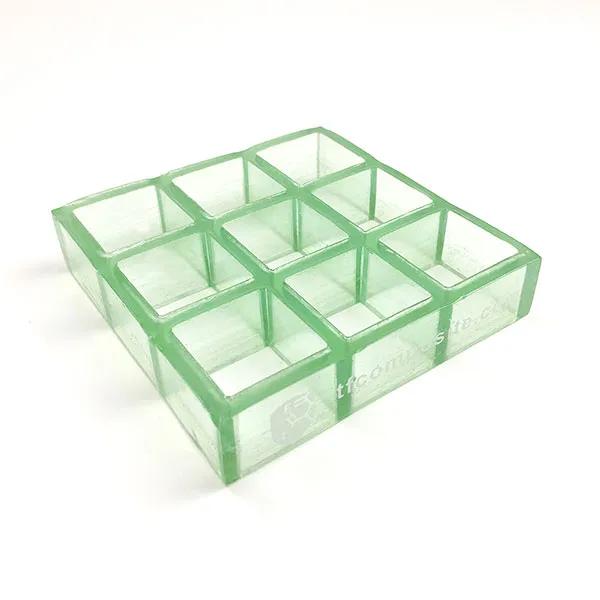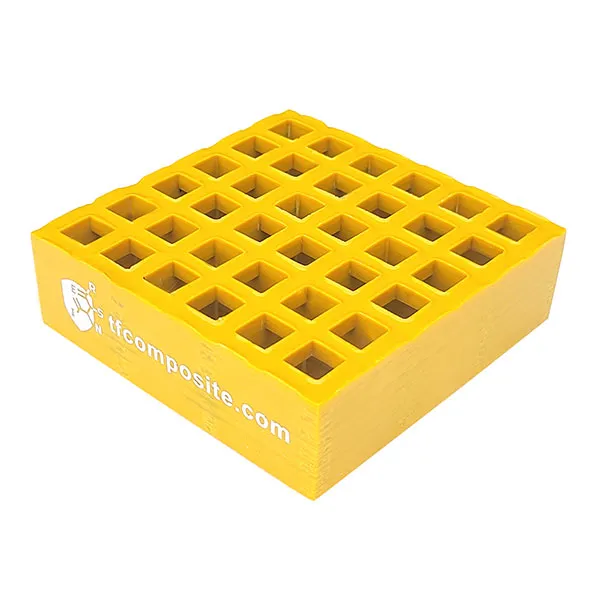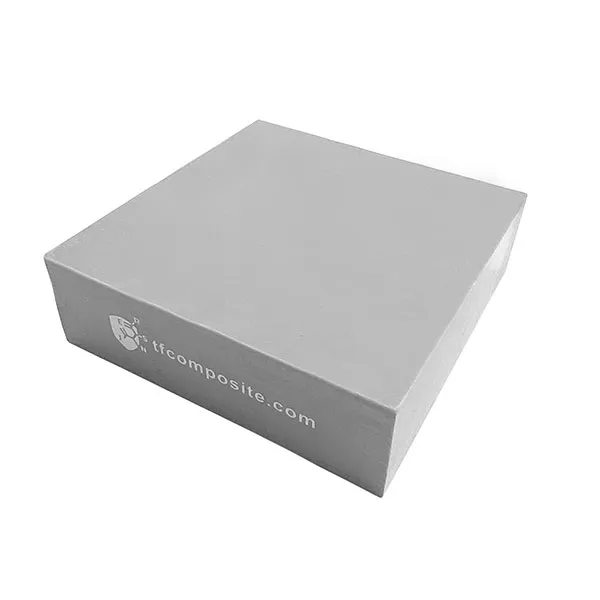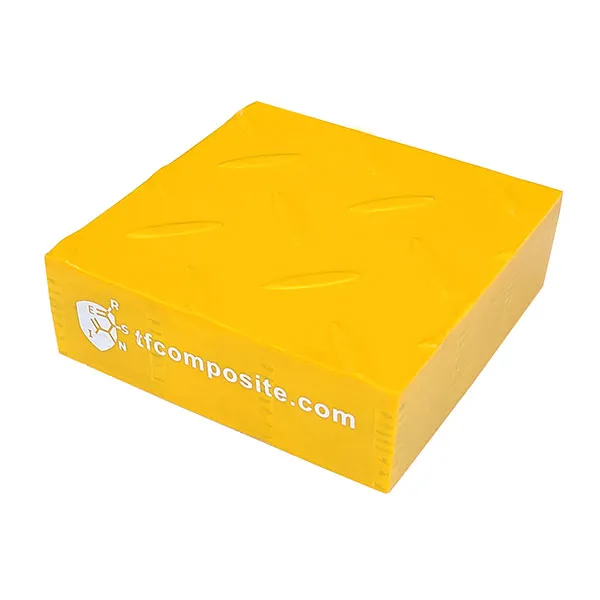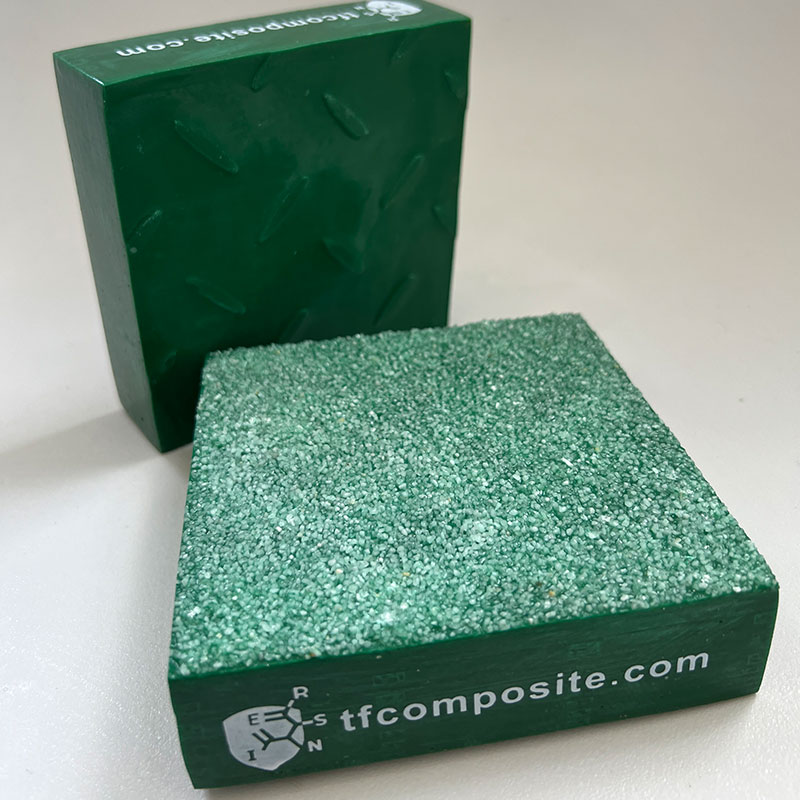Product performance introduction
FRP (Fiberglass Reinforced Plastic) stair systems offer a reliable, long-lasting, and low-maintenance alternative to traditional metal or wood stair structures. Designed to withstand demanding industrial and outdoor environments, FRP stair systems are particularly well-suited for applications where corrosion, moisture, or chemical exposure would degrade conventional materials.
A complete FRP stair system typically includes stair treads, stringers, handrails, and platforms—all made from lightweight yet high-strength composite materials. These components are manufactured using either molded or pultruded processes to ensure consistency in quality and performance. The stair treads often feature an anti-slip gritted surface to enhance safety, even in wet, oily, or icy conditions.
One of the biggest advantages of FRP stair systems is their resistance to rust, rot, UV radiation, and chemical attack. Unlike steel, FRP does not require galvanizing or repainting, and unlike wood, it doesn’t warp, splinter, or degrade over time. This makes FRP a cost-effective solution over the product’s lifecycle, especially in marine, chemical, power, or wastewater facilities.
Installation is fast and efficient. Due to the lightweight nature of FRP, no heavy lifting equipment is needed, and the system can often be assembled using basic hand tools. Modular designs also allow for easy customization and expansion as site needs change.
With excellent mechanical strength, electrical insulation, and fire-retardant options available, FRP stair systems meet the safety and structural requirements of most industrial and commercial applications.
FRP Stair systems Specifications & Technical Parameters
🔧 Material Composition
- Base Material: Fiberglass Reinforced Plastic (FRP)
- Resin Types:
- Isophthalic Polyester (standard use)
- Vinyl Ester (chemical resistance)
- Phenolic (high fire safety)
Stair Treads
| Parameter | Specification |
|---|---|
| Type | Molded or Pultruded FRP Grating |
| Thickness | 25 mm, 30 mm, or 38 mm |
| Mesh Size | 38 mm × 38 mm (standard) |
| Surface Finish | Grit-top (anti-slip), concave (optional) |
| Load Capacity | ≥ 500 kg/m² (varies by thickness & span) |
Stair Stringers
| Parameter | Specification |
|---|---|
| Material | Pultruded FRP Structural Profiles |
| Standard Profile | Channel or I-beam |
| Slope Angle | Typically 30°–45° |
| Finish | Smooth or UV-resistant coated |
🛠️ Handrail System
- Design: Round or square pultruded profiles
- Height: 1100 mm standard (customizable)
- Load Resistance: Complies with OSHA/GB standards
- Accessories: End caps, elbow connectors, mounting brackets
Mechanical Properties
| Property | Value |
|---|---|
| Tensile Strength | ≥ 240 MPa |
| Flexural Strength | ≥ 300 MPa |
| Modulus of Elasticity | 6000–8000 MPa |
| Impact Resistance | High (no cracking under impact tests) |
Safety & Environment
- Slip Resistance: Certified anti-slip gritted surface (ASTM D2047 compliant)
- Fire Resistance: Available with ASTM E84 Class 1 rating
- UV Resistance: Excellent, outdoor-rated
- Electrical Conductivity: Non-conductive
- Operating Temperature: -40°C to +120°C (continuous)
Why Choose Us
Expertise in FRP Grating Manufacturing
With over 20 years of experience, our factory specializes exclusively in the design, development, and production of high-performance FRP (Fiberglass Reinforced Plastic) gratings. Our deep industry knowledge ensures that every product meets the most demanding industrial standards.
Advanced Technology and Equipment
We utilize state-of-the-art manufacturing equipment and precision molding technology to produce gratings with superior strength, corrosion resistance, and dimensional accuracy. Our commitment to innovation means your project benefits from the latest advancements in FRP technology.
Customized Solutions
From panel sizes and resin types to surface finishes and colors, we offer complete customization to meet your unique application needs—be it industrial flooring, stair treads, trench covers, or marine platforms.
Stringent Quality Control
Every product undergoes a rigorous quality inspection process, including load testing, flame retardance checks, and corrosion resistance analysis. Our ISO-certified quality management system ensures consistent excellence in every batch.
Competitive Pricing
We offer factory-direct pricing without compromising on quality. With optimized production processes and bulk manufacturing capabilities, we help our customers achieve cost savings at scale.
Reliable Delivery and Global Reach
We maintain a large stock of standard products and operate a streamlined logistics system, ensuring fast delivery times locally and internationally. We’ve successfully served clients in over 15 countries.
Hot-Selling Products
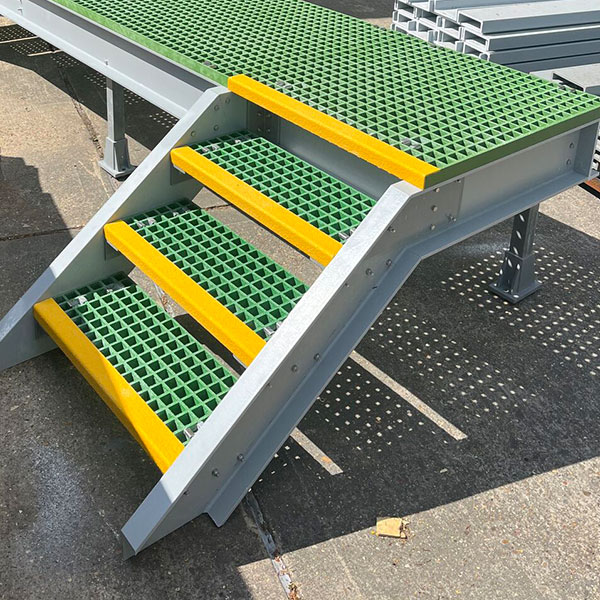
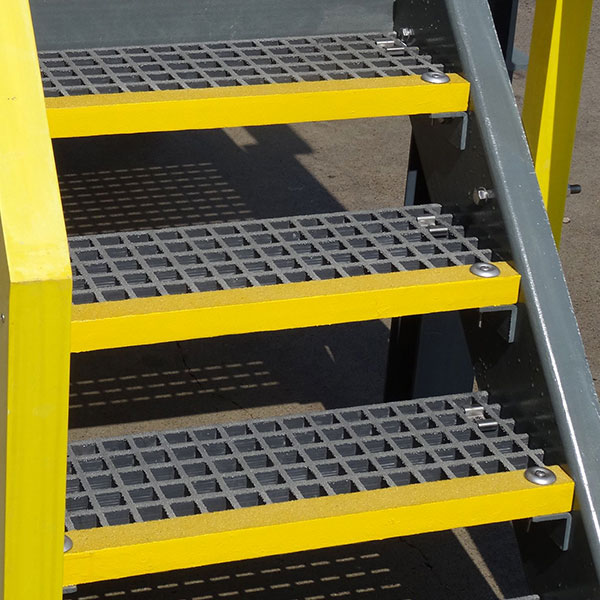
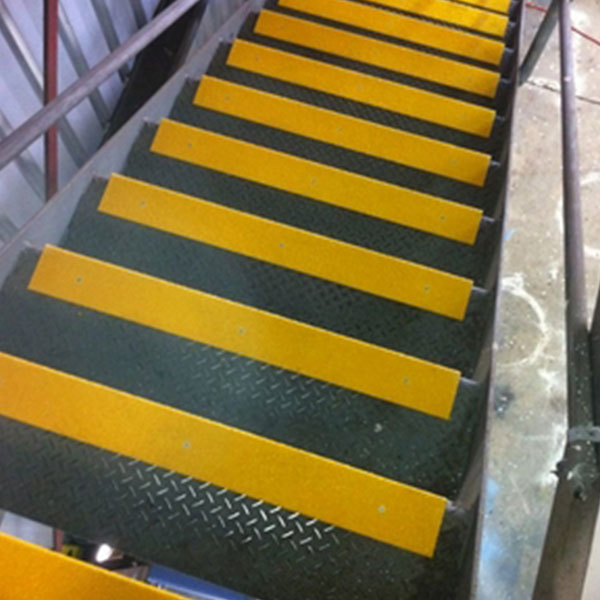
Application Scenarios
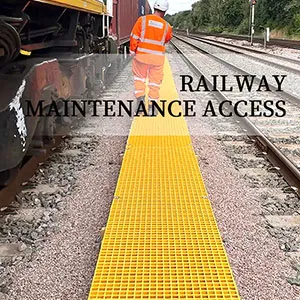
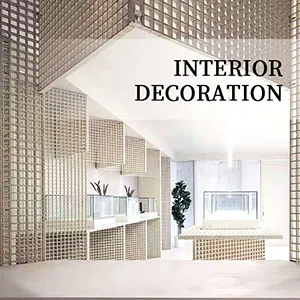
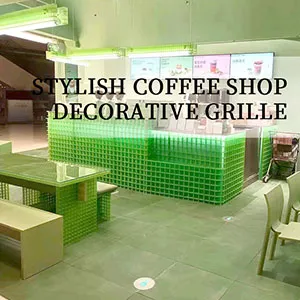

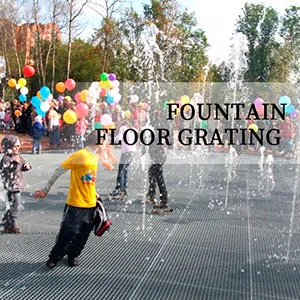
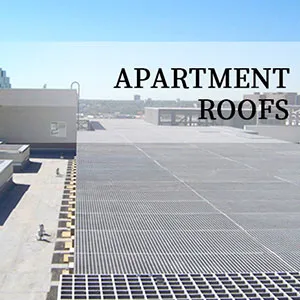
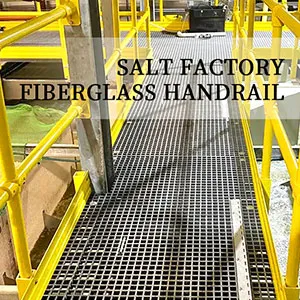
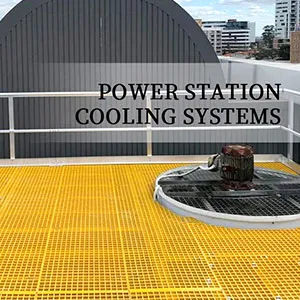
About the Factory
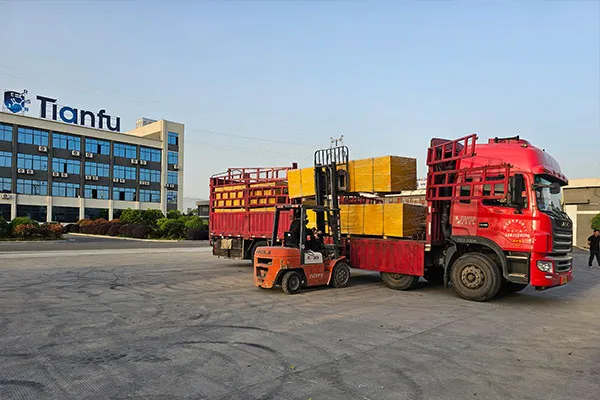
We are a professional FRP Grating manufacturer with 20+ years of experience. Our 26,000㎡ factory is ISO9001 certified, serving clients across 30+ countries with OEM/ODM capability. We provide customized solutions and fast delivery worldwide.

Our FRP gratings are manufactured in accordance with ISO 9001 standards and tested per ASTM E84 (Class 1 fire rating), ASTM D638/D790 for mechanical performance, and comply with BS 476 and EN 13706 standards. Third-party testing available through SGS and TUV upon request.
Exhibition
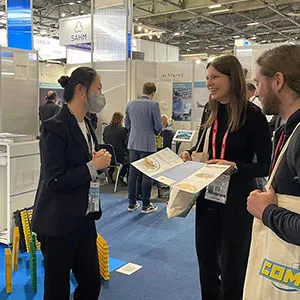
JEC WORLD 2023

JEC WORLD 2024
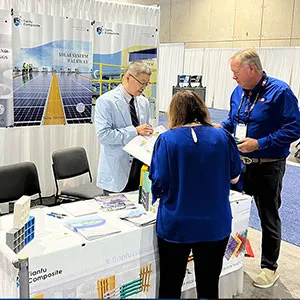
CAMX 2025
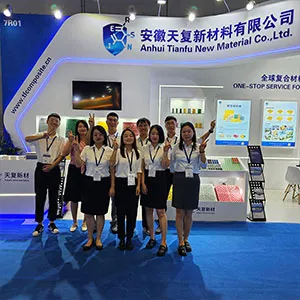
SHANGHAI 2025
Certificate
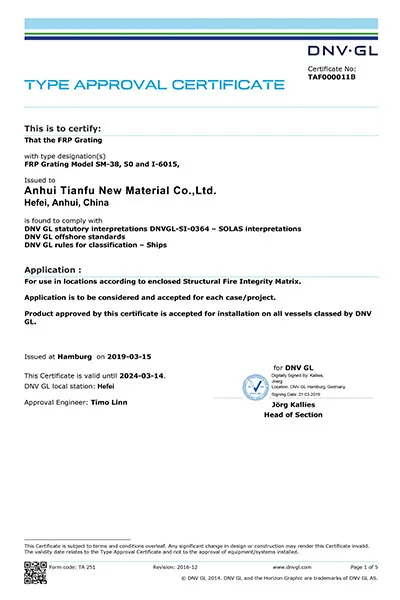
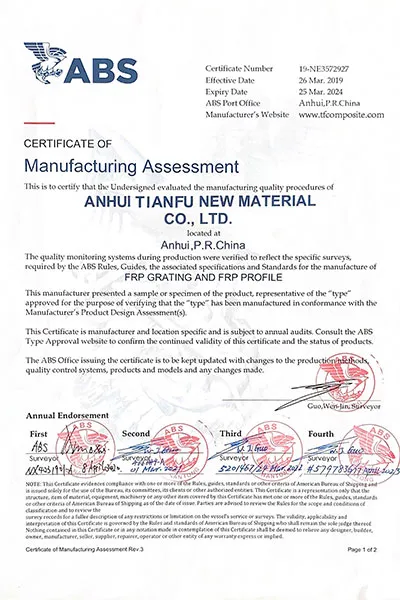
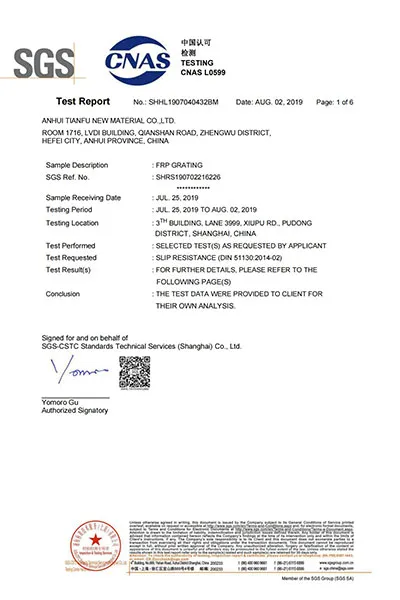

Other Products
VR Factory Tour
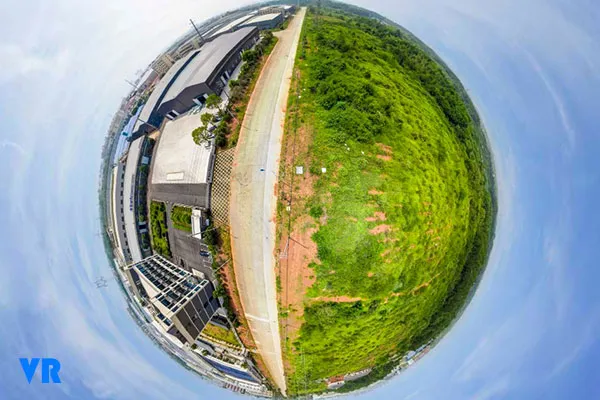
FRP Stair systems
Series :
Fiberglass Molded Grating >application
Construction and Infrastructure,Industrial Plants,Electrical & Utility,Transportation,Water & Wastewater Treatment,Telecommunications & Antennas,Public and Recreational Areas
Type :
Molded or Pultruded FRP Grating
Thickness :
25 mm, 30 mm, or 38 mm
Mesh Size (Molded) :
38 mm × 38 mm (standard)
Surface Finish :
Grit-top (anti-slip), concave (optional)
Load Capacity :
≥ 500 kg/m² (varies by thickness & span)
FAQ
Q :
What is an FRP stair system made of?
A :
FRP stair systems are made from Fiberglass Reinforced Plastic, a composite of glass fiber and a polymer resin (like polyester, vinyl ester, or phenolic). Components include treads, stringers, handrails, and fasteners—all corrosion-resistant and non-conductive.
Q :
What are the advantages of FRP stairs compared to metal or wood?
A :
FRP stair systems offer: ✅ High corrosion and chemical resistance ✅ Non-slip surface for improved safety ✅ Lightweight and easy installation ✅ Non-conductive and thermally insulating ✅ Maintenance-free – no rust, rot, or repainting required
Q :
Are FRP stair systems safe for industrial use?
A :
Yes. FRP stairs are engineered to meet OSHA, ISO, and GB safety standards. Anti-slip surfaces, strong load capacity, and optional fire-retardant resins ensure safe use in industrial, chemical, or outdoor environments.
Q :
Can the stair system be customized?
A :
Absolutely. FRP stair systems can be customized in: Tread size and thickness Stair width and angle Color and surface texture Handrail type and height Custom platforms, landings, and modular kits are also available.
Q :
How strong are FRP stair treads?
A :
Standard FRP treads can support 500–1000 kg/m², depending on thickness and span. Pultruded treads offer higher load capacities for heavy-duty use.
Q :
Is installation complicated?
A :
No. FRP stairs are lightweight and modular. They can be installed using basic tools—no welding or heavy lifting equipment is needed. Pre-fabricated kits are available for fast assembly.
Q :
Are FRP stair systems suitable for outdoor use?
A :
Yes. FRP is highly resistant to UV, rain, snow, salt, and temperature changes, making it ideal for outdoor and rooftop applications.
Other related products

